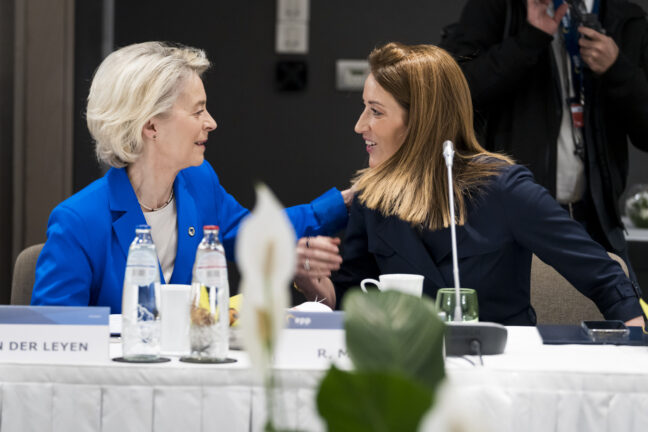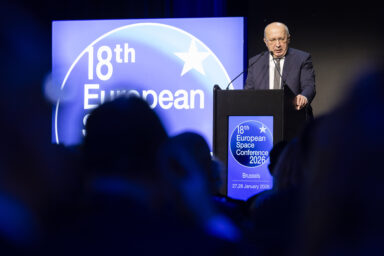Europe’s next seven-year budget, the Multiannual Financial Framework for 2028–34, is still only a set of spreadsheets, yet the battle lines are already sharpening. The sooner the budget wins EU co-legislators‘ approval, the likelier it is to preserve whatever modest ambitions it has, analyst Lucas Resende Carvalho of the German Bertelsmann foundation tells EU Perspectives.
The Bertelsmann Stiftung, a German think-tank, has studied the newly proposed MFF plan diligently, and sees trouble ahead. Its early reading hints at a negotiation that could prove nastier—and more consequential—than any since the euro crisis. Lucas Resende Carvalho, project manager of the foundation’s Programm Europa’s Zukunft (or Europe’s future), told EU Perspectives as much in an interview conducted over email. “We follow the process closely and aim to contribute through our analyses to a successful outcome of these crucial negotiations,“ he wrote.

First comes size, says Mr Carvalho, who currently works on the EUs industrial strategy in the context of the upcoming MFF, and specialises in the European Competitiveness Fund. “Even in its current form, the proposed volume is modest in comparison to the challenges ahead, and the real figure—accounting for inflation and NGEU repayments (after which the proposal leaves only about 0.04 per cent of EU GNI in net additional resources)—is lower than the public debate suggests,“ he says.
A parliamentary revolt
That is not much, given the Union’s ambitions—to rearm Ukraine, turbo-charge green industry and out-compete America and China. Yet even that modest envelope looks hard to defend. Fiscal rows have turned toxic in many a member state, while populists and EU-skeptics are an the rise. “The current political and macroeconomic environment is not conducive to even modest increases. In several member states, including Germany, fiscal debates have become highly polarised, while EU-sceptic parties are gaining ground across Europe,“ Mr Carvalho notes. “It will thus be crucial that the overall volume does not shrink significantly in the process.“ But, should governments arrive in Brussels brandishing red pens, that is precisely what is going to happen.
Next comes modernisation. “The Commission’s plans to modernise and simplify the budget structure are timely and important,“ Mr Carvalho says. “Greater flexibility and fewer but more impactful programmes could make the EU more responsive to shifting challenges and priorities.“
The proposed shift in spending priorities toward common European goods, such as energy and digital infrastructure, and industrial policy, is strategically right. — Lucas Resende Carvalho, project manager at the Bertelsmann Stiftung
However, the Council is not the only potential source of friction. The idea of more flexibility—for money to be able to shift quickly in the case of crisis—frightens the European Parliament, which fears that looser rules will let national ministers bypass MEPs. (This week’s developments, in which the Parliament has threatened to kill the entire proposal unless the Commission reworks it, is a testimony to the lawmakers‘ resolve.)
Spread cuts evenly
“The European Parliament’s position will be one of several aspects to watch, as it is likely to resist larger increases in flexibility, fearing a loss of influence,“ the Bertelsmann researcher sees the writing on the wall. Expect parliamentary negotiators to trade every inch of flexibility for fresh oversight powers—and to put the package at risk if they do not get them.
Spending priorities bring out the sharpest knives. Again “the proposed shift in spending priorities toward common European goods, such as energy and digital infrastructure, and industrial policy, is strategically right,“ Mr Carvalho explains. History, however, offers a bleak precedent. In every MFF haggling since Maastricht, the first victims of cuts have been these lines, while farm subsidies and regional handouts would emerge largely unscathed.
You might be interested
“Experience with MFF negotiations shows that when budget cuts occur, they often affect exactly these excellence-based spending areas, as member states tend to defend traditional expenditures like agriculture and cohesion policy,“ he warned against repeating the same mistakes once again. Trimming this time must be spread evenly; skimping on forward-looking investment would condemn the EU’s climate and competitiveness agendas before they start. “Cuts should not come at the expense of Europe’s future investments but be applied horizontally across all priorities.“
An easy punching bag
Finally, the calendar conspires. Europe is to endure elections in France, Poland, Hungary and a clutch of others during the MFF negotiation phase. Each ballot offers fresh opportunities for candidates to turn the EU purse into a punching-bag. “The negotiation period coincides with numerous crucial national elections, including in France, Poland, and Hungary. The potential rise of populist or EU-sceptic forces in key member states could make the MFF a tool in domestic political battles, putting the negotiations under heavy strain,“ Mr Carvalho cautions.
Key structural decisions should ideally be reached under the Danish Presidency’s first negotiation box to avoid later deadlocks. — Lucas Resende Carvalho, project manager at the Bertelsmann Stiftung
“Therefore, it will be crucial not to lose momentum in the early phase. Key structural decisions should ideally be reached under the Danish Presidency’s first negotiation box to avoid later deadlocks due to the political narrow windows,“ he says. Lose momentum early, and the talks could sink into the same mire that delayed the last budget and nearly derailed the pandemic fund.
The Stiftung’s researchers know a fragile deal when they see one. This time, the Europa’s Zukunft project manager says, if Europe pares back ambition or dithers too long, the cost will be measured not merely in missed targets, but in lost influence on the world stage.











